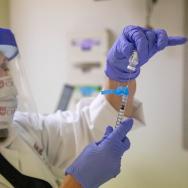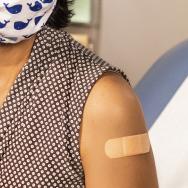For the latest guidance on COVID-19 from the University, visit the UChicago Forward website.
As the COVID-19 vaccine rollout gains steam across the country, an increasing number of people are finding themselves with more protection from the SARS-CoV-2 virus. But just because you’ve been fortunate enough to get a vaccine doesn’t mean you can return to your pre-pandemic lifestyle—at least not yet.
“Your new vaccine will protect you from serious disease and will very likely keep you from getting COVID-19 at all,” said Assoc. Prof. Emily Landon of the University of Chicago Medicine. “But you could still have a mild or asymptomatic infection and that could still set off a chain of infections and complications in others.”
An infectious diseases physician who has become one of the state’s leading authorities on the pandemic, Landon stressed the importance of reaching “herd immunity,” which occurs once a high percentage of the population is immune—either from having had COVID-19 or getting the vaccine. In that situation, cases are low, and they stay low because there aren’t enough susceptible people who can pass the virus around.
Until then, you’ll need to continue taking precautions (like wearing a mask and keeping distance) in certain situations.
“Over the coming months, expect things to look more and more like ‘normal,’” Landon said, “but it won’t happen overnight and there may be bumps in the road along the way.” In the following Q&A, she discusses what you can do safely after being vaccinated, and the steps you should still take to protect yourself and others.
How effective is the COVID-19 vaccine?
Vaccines make you immune, not invincible. The COVID-19 vaccines that are currently available in the U.S. provide remarkable protection against the SARS-CoV-2 virus. But, like anything, they’re not 100% effective. Current data show the mRNA vaccines are about 94% to 95% effective. That means there’s still a chance people who’ve been fully vaccinated could contract COVID-19. While we know people who’ve been fully vaccinated won’t get as sick as they would have without a vaccine, you could still pick up a mild or asymptomatic case of COVID-19. If that happens, you’ll be able to spread virus to people who haven’t been vaccinated yet.
As the vaccine roll out continues and more and more people are vaccinated, the risk of catching a mild case or spreading it to someone else will decrease. We will also learn more about the strengths and weaknesses of the different vaccines in different situations.
When does full protection against COVID-19 take effect?
While the vaccines provide a high-degree of (but not total) protection from COVID-19, they also take time to reach their full level of protection. Both the Pfizer-BioNTech and Moderna vaccines require two doses, which need to be given in specific increments. The first dose offers good protection, but you won’t get the vaccine’s full and durable protection until two weeks after your second dose. The Johnson & Johnson vaccine only requires one dose, but it also needs time to reach its full protective power. Don’t consider yourself fully protected until two weeks have passed from your final vaccine (Pfizer and Moderna) or your only vaccine (Johnson & Johnson).
Since they’re so new, we don’t have data to say how long the vaccines’ protection lasts. But based on what we know about coronaviruses and mRNA vaccines, we think you may need a booster in the future; we don’t yet know when or how often.
When will we achieve herd immunity?
If we want to see post-COVID times come faster, we need two things: more vaccines and more people who are vaccinated.
Diseases need people to spread. So the more people who are vaccinated, the safer everyone is. While things are trending in the right direction, we know restrictions shouldn’t get lifted until we have lower rates of COVID-19 in our communities. And that won’t happen until a lot more people have access to, and are able to get, the vaccine.
What can you do after you’re fully vaccinated?
Having a vaccine for yourself is great, and it certainly gives you peace of mind, even if you still have to take precautions.
The latest CDC guidance says people who are fully vaccinated can spend time unmasked and inside with others who are also fully vaccinated. The national’s top public health agency also says that it’s safe, in certain instances, for fully vaccinated people to spend unmasked time inside with those who are unvaccinated—provided those who are unvaccinated are from the same household and have no high-risk health conditions. (If there’s unvaccinated people from more than one household, or an unvaccinated person has high-risk conditions, everyone should continue to wear a mask. And it’s best to meet outside.)
If you live with or care for people who can’t yet get vaccinated, you should still keep your unmasked contacts limited so you don’t bring home what may be a mild case for you, but one that turns into a serious illness for them.
As cases decline in your area and vaccination rates increase, close contact with others gets safer and safer, but the new variants could still bring another surge. We are nearing the end of this marathon, and now isn’t the time to quit early. Cases are decreasing in most parts of the country, but they are still high. The mix of high case counts and growing vaccination levels makes an epidemiological soup that is primed to breed new variants that are resistant to the vaccines. We definitely don’t need that hurdle at the end of the race, so please keep taking care to protect yourself and your loved ones.
Just like you did at the start of the pandemic, make sure you stay on top of the rules and guidance in your community and talk candidly to family and friends about their and your risk tolerance as we slowly make our way out of this mess.
—Adapted from a story first published by UChicago Medicine.

